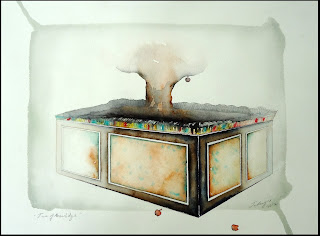- Vishal Tondon
Tree of Knowledge. 2012
Jehangir Jani is known in his circle as a multi-talented artist.
He has worked in quite a few artistic mediums including sculpture,
installations, painting and film. Though he is well known as an accomplished
sculptor, his project with the delicate medium of watercolour has been to
examine the result of translating tangible objects into a fragile form. For
some time now, he has been exploring the possibilities of this very soft yet
difficult medium. To Jani’s credit, he has been able to convey, through the
flimsy yet willful medium of watercolour subjects that are tough and would
otherwise have required the tenacity either of sculpture or oil paint. His new
suite of paintings, ‘Jannis – A Relook’, are on view at Kalakriti Art Gallery. These
paintings deal with the materiality of objects, rendered in the elusive medium
of watercolour.
Jani’s new work exposes the difficult relationship passion and
knowledge share. The tortured relationship between the two has been grist for
the mill for ages; whole canons of religions, myth and policies have been built
around the love-hate equation between passion and knowledge. The philosopher
Foucault has mentioned how knowledge is built and sustained through the
exclusion and suppression of alternate voices. We see a similar opinion being
echoed in Jani’s new work. His new painting speaks of the violence and the use
of an iron fist that go into the building of knowledge, including the canon of
science which is apparently the foundation of modern thought and society.
Jani’s suite of exquisite watercolours sullied with smudged charcoal blotches
comment on the parasitic dependence of high knowledge on the blood and the
sweat of the common man, the other and the minority, which are all declared as
disposable after use.
High knowledge serves mainly to define and protect the interests only
of a powerful few. It adapts and appropriates material from the minor and
alternate discourses, which it posits as its own. There is no knowledge other
than mainstream knowledge. The engagement of the mainstream discourse with the
minor only serves to complete and validate the mainstream.
Van Gogh,
who had earlier equated art with manual labour, questioned hierarchies in Art at
the dawn of Modernism. His paintings are like the musings of a Christ for the
modern world; “The poor shall inherit the earth.” His work
anticipates the attitude of the art movement of Arte Povera that was to manifest itself in Italy in the 1960s, the
latter an outcome of the crisis of Modernity. Two prominent artists of the
movement that was Arte Povera,
Michelangelo Pistoletto and Jannis Kounellis worked to break down the
hierarchies of "Art" and common things. The use of impoverished
materials is certainly one aspect of the definition of Arte Povera. It
is the interest in underprivileged materials in the work of Kounellis that has moved
Jani the most. His recent paintings take off from the works of Jannis Kounellis
and Jani invests in the configurations Kounellis suggested the hint of the
transgressing desire.
This
component of desire enters Jani’s suite of paintings with elements such as
sheer slip of cloth and bitten scarlet apples. In these paintings we can see
Jani’s quest as a sculptor; the juxtaposition of the fragile and the tough continues
to excite him as an artist.
The apples
are of peculiar interest here. They might not be golden, but they do stand for
the apple of discord. Also, they stand for knowledge, as is clearly indicated
by the title of one of the paintings, ‘The Tree of Knowledge.’ Bitten apples in
this suite of paintings recall death by poisoning, as in the story ‘Snow
White.’ Bitten apples also recall death by poisoning of Alan Turing, the father
of computer science and artificial intelligence. Finally, they recall the
original sin and the fall of man. As it turns out in all the three above mentioned
cases, mortality was hastened by an unpardonable attribute in each of the
protagonist involved; respectively, unique beauty, transgressing desire, and
free will.
Interestingly, the bitten apple as an icon has also been
immortalized by Steve Jobs in his company’s logo.
The knowledge of our times is defined by artificial intelligence
and scientific information. One would presume that such advances are made
possible by the judicious application of rationality and fairness. Recent
history proves otherwise. Turing’s suicide by poisoning evidently was brought
on by his dissatisfaction at having to live life according to the dictates of
the dominant discourse. His contributions to knowledge and human experience
could not compensate for his sexual desire for another male, a non-conformism.
His death exposes the underbelly of the hegemonic system that built the
knowledge of our times. It also is symptomatic of the grimy side of affairs that
is the other face of human progress.
Jehangir Jani’s new series, ‘Jannis
– A Relook’ revisits, all at once, a complex array of histories relating to
sexuality, culture and scientific knowledge. The war between knowledge and
passion is a dirty one; each feeding off even while it enriches the other.
Jani’s recent work comes at the right time; we have been wondering for some
time now about who the real beneficiaries of knowledge are and to what extent
free will is possible in an age that boasts of rights to knowledge and
communication that are apparently universal and freely available.

No comments:
Post a Comment